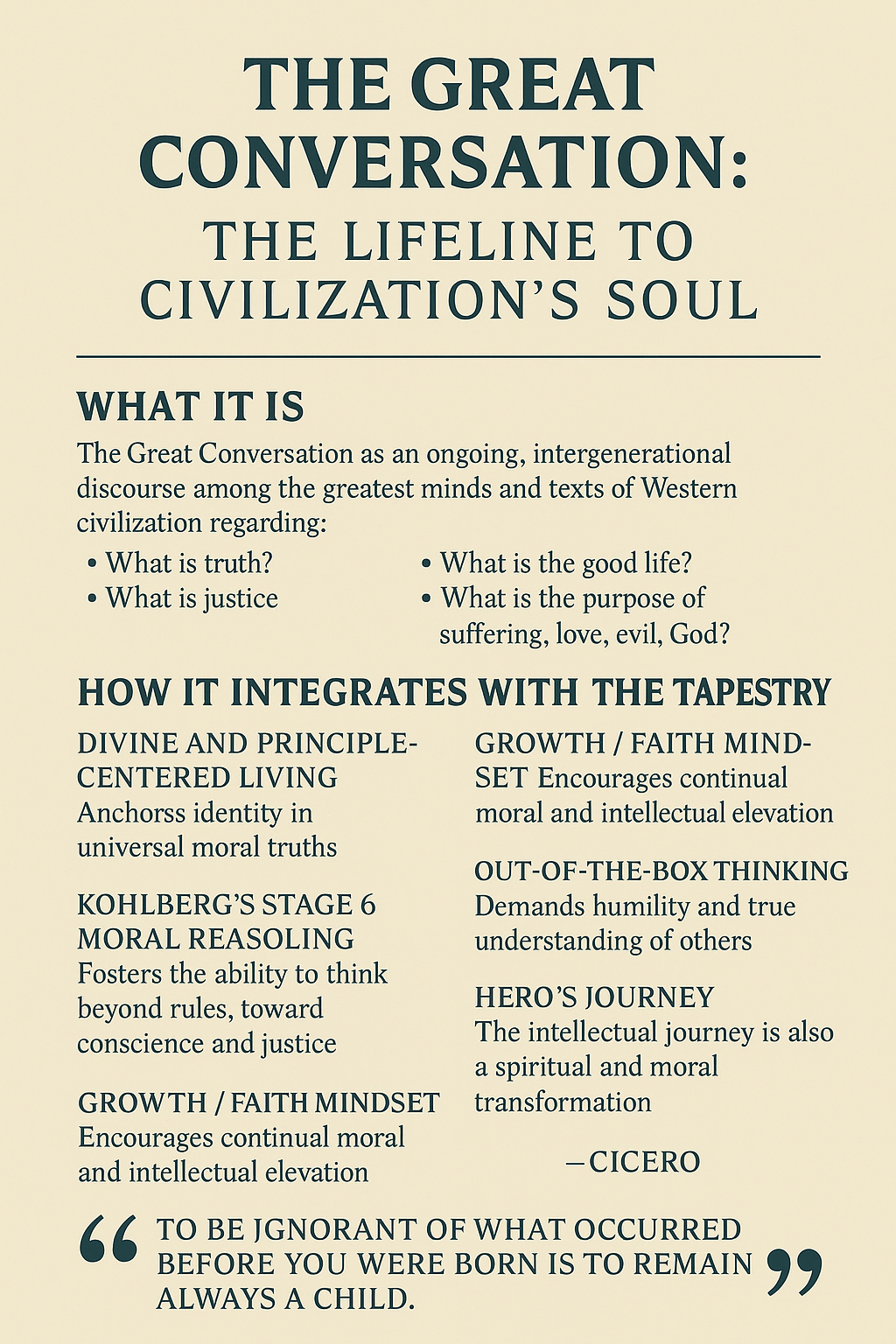What is the Great Conversation?
The Great Conversation refers to the continuous, intergenerational discourse among the greatest minds and texts of Western (and by extension, human) civilization. From Plato to Augustine, Aquinas to Newton, Locke to Lincoln, Dostoevsky to Lewis — each thinker engages with the questions, answers, and critiques of those who came before. This conversation spans centuries and speaks across cultures, grappling with life’s core questions:
- What is truth?
- What is justice?
- What does it mean to be free?
- What is the good life?
- What is the purpose of suffering, love, evil, and God?
The term was popularized by Mortimer J. Adler in The Great Books of the Western World, who saw this as the collective mind of humanity seeking wisdom through reasoned discourse, moral inquiry, and humility before truth.
How It Integrates with the Tapestry
1. Divine and Principle-Centered Living (Stephen Covey)
The Great Conversation seeks objective truths that transcend time. Like principle-centered living, it asks not, “What do I feel?” or “What is trending?” — but “What is eternally right?” Both prioritize universal principles over relativistic thinking.
“To be ignorant of what occurred before you were born is to remain always a child.” — Cicero
2. Lawrence Kohlberg’s Moral Development
Engaging in the Great Conversation cultivates Stage 6 thinking — principled conscience. It trains the mind to ask: “What is just, fair, and universal?” rather than merely conforming to rules (Stage 4) or popularity (Stage 3).
The individual becomes a moral philosopher, not a moral consumer.
3. Tytler’s Cycle and the Fall
Nations ascend into liberty when citizens wrestle with the ideas of liberty, virtue, and responsibility — the very subjects of the Great Conversation. But when societies abandon this discourse for pleasure, distraction, and relativism, they fall into complacency, apathy, and dependence.
Ignoring the Great Conversation is a step toward forgetting who we are.
4. Character Ethic vs. Personality Ethic
The Great Conversation fosters the character ethic — rooted in courage, self-mastery, humility, and truth-seeking. It rejects the shallow, image-based personality ethic that dominates today’s culture.
“The unexamined life is not worth living.” — Socrates
5. Mindset Theory
It fosters a Faith-Filled and Growth Mindset:
- Growth: Reading Plato or Aquinas stretches the mind.
- Faith-Filled: Belief in objective good, knowable truth, and transcendent purpose.
Staying in the Conversation requires humility: “I do not yet know — but I seek to.”
6. Feeding the Good Wolf
Each engagement with truth, beauty, and justice feeds the good wolf. The Great Conversation disciplines the soul against laziness, shallowness, and pride.
“Reading great books is not to escape reality, but to face it more clearly.”
7. Arbinger’s Out-of-the-Box Thinking
The Great Conversation pulls us out of the box of our assumptions. It breaks tribalism. It asks us to read those we disagree with, and understand them deeply — to think like Lincoln and Lenin, Plato and Nietzsche — not to adopt, but to comprehend.
8. The Hero’s Journey
To enter the Great Conversation is to heed the Call to Adventure — to leave the shallow comfort of echo chambers and embark on the deeper journey of the mind. Each thinker becomes a mentor, a trial, a death of old ideas, and a rebirth into higher awareness.
What Happens Without It?
When the Great Conversation is silenced:
- Citizens forget their history and become easy prey to propaganda.
- Schools teach what to think, not how to think.
- Public discourse becomes slogans, not reason.
- Identity is shaped by emotion and culture, not wisdom and reflection.
- The Fragile Chain of Freedom breaks — not by attack, but by apathy.
Summary Table: The Great Conversation in the Tapestry
| Element in the Tapestry | The Great Conversation’s Contribution |
|---|---|
| Principle-Centered Life | Anchors identity in universal moral truths |
| Kohlberg’s Stage 6 Moral Reasoning | Cultivates the ability to think beyond rules, toward conscience and justice |
| Growth/Faith Mindset | Encourages continual moral and intellectual elevation |
| Arbinger Institute (Out-of-Box) | Demands humility and true understanding of others |
| Hero’s Journey | The intellectual journey is also a spiritual and moral transformation |
| Tytler’s Cycle | Holds societies accountable to preserve liberty through virtue |
| Character over Personality Ethics | Forms depth and discipline in contrast to modern performative shallowness |
| Feeding the Good Wolf | Strengthens virtue, compassion, and wisdom |
Final Word
To stay in the Great Conversation is to keep a lifeline to civilization’s soul.
To abandon it is to return to the cave — not to find truth, but to watch shadows.
Our tapestry calls for a generation that remembers what was said before, wrestles with it now, and builds with it for the future. In that way, every article writen, every child raised, every principle we live by — becomes part of that same eternal conversation.







